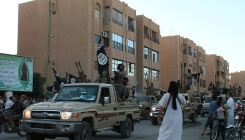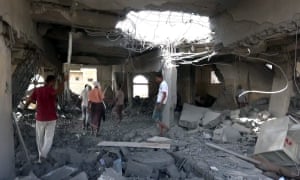Obama's support for the Saudi Arabian genocide in Yemen is nicely balanced by his support for the Kurdish People’s Protection Units, known as the YPG.
Syrian Kurds are the only democratic ,non-sectarian, feminist organized group in the Middle East and deserve full-throated support from all nations, including Germany, France, Great Britain, Russia, and China.
None should not be shy about throwing their support behind he YPG, challenging Erdoğan and his Turkish dictatorship, as Obama is doing. (The Gulf Cooperation Council will also be challenged, as it should be.)
Here's hoping Obama succeeds in Syria and manages to humanize Saudi Arabia as he appears to be slowly trying to do. To slowly for my taste.
The Washington Post article is clear and helpful in understanding Syria and its future. Highly recommended
THE WASHINGTON POST
‘We’re not in perfect control’: U.S. plans operation against Islamic State in Syria despite obstacles
A member of Syrian Democratic Forces surveys the town of Manbij, Syria, on Sept. 25. After pushing the Islamic State out of Manbij in August, the U.S.-backed group will turn its attention to nearby Raqqa. (Ayham Al-Mohammad/AFP/Getty Images)
By Missy Ryan and Karen DeYoung October 31 at 7:48 PM
The Obama administration is racing to settle questions that could scuttle a planned offensive against the Islamic State in the Syrian city of Raqqa that Defense Secretary Ashton B. Carter has said will begin “within weeks . . . and not many weeks.”
Senior administration officials have attributed the newly described urgency to Raqqa’s symbolic role as the “capital of the caliphate” claimed by the militants and intelligence indicating that it is the center of Islamic State planning for terrorist attacks in Europe and the United States.
[With the battle for Mosul underway, U.S. sets sights on Raqqa]
But the officials acknowledged a wealth of problems that could derail the offensive, including the need to gather and train additional Syrian forces. More ominously, they cite the explosive dynamics between two allies: Turkey and Syrian Kurdish fighters, who form the bulk of the existing offensive force.
“This is one of the situations in which we have contacts and influence over all the actors. But we’re not in perfect control,” said one of several officials who discussed the operation on the condition of anonymity to speak candidly about its planning and potential pitfalls.
The uneasy mix of forces battling the Islamic State VIEW GRAPHIC
President Obama approved the Raqqa plan in meetings with top national security aides in early October. But concerns about unresolved problems have put off initial hopes that the offensive could take place simultaneously with a major operation to retake the Iraqi city of Mosul that began two weeks ago.
Lt. Gen. Stephen Townsend, the U.S. commander of the anti-Islamic State coalition, described the current Raqqa plan as “overlapping” the Mosul offensive. “We want to pressure Raqqa” so that militants escaping Mosul do not “have a convenient place to go,” Townsend said last week, after Carter’s description of the timing during a news conference at NATO.
The Pentagon, at least temporarily, has withdrawn a controversial request to provide direct arms shipments to the Kurdish People’s Protection Units, known as the YPG, which forms the bulk of the U.S.-backed Syrian Democratic Forces slated to undertake the Raqqa offensive. Consideration of the weapons was deferred, officials said, because initial plans to encircle the city by taking control of surrounding villages and access routes would not require additional weaponry and because conflicts with Turkey remain unresolved.
Turkey, a NATO ally and part of the U.S.-led coalition against the Islamic State, considers the YPG a terrorist force, allied with Turkey’s own Kurdish separatist movement. Its concern has grown as the Syrian Kurds, with strong U.S. backing, have taken control of much of the Syria-Turkey border from the militants.
In August, after the YPG-
dominated Syrian Democratic Forces pushed the Islamic State from the city of Manbij, northwest of Raqqa, Turkey struck back with a cross-border air and ground offensive against the Kurds.
Since then, Turkish troops and a force of about 1,000 Arab fighters from the separate Free Syrian Army have occupied a 15-mile-deep stretch along the border inside Syria. The Turkish goal is to create a 5,000-square-mile area free of the Islamic State and the Kurds, including the northwestern cities of al-Bab, Azaz and Jarabulus, U.S. officials said.
In a statement Thursday, Turkish President Recep Tayyip Erdogan said that once his forces take Islamic State-held al-Bab, the plan is to move onward to Raqqa.
Erdogan said Thursday that he had urged Obama in a telephone call the night before not to involve the YPG in a Raqqa offensive. “We shared our plans with him,” Erdogan said in public remarks. “We said, ‘Come, let’s kick Daesh out of Raqqa together.’ ” Daesh and ISIL are alternate terms for the Islamic State.
Administration officials described the call differently. Obama, they said, told Erdogan in no uncertain terms that the decision had been made to launch the initial phase of the offensive to isolate Raqqa, using the YPG-dominated Syrian Democratic Forces (SDF) as the only force capable of succeeding. The United States would work to control the Kurds, but Turkey needed to support the coalition-backed operation or stay out of the way.
[Erdogan reasserts Turkey’s role in wars in Syria and Iraq]
Townsend emphasized the same point in a Thursday news conference. Turkey’s fight against the Kurdish forces, he said, was “not helpful for the coalition. And we ask members of the coalition to refrain from undertaking activities that are not focused on the defeat of Daesh.”
As far as Turkey joining the Raqqa offensive, Townsend said, “We’ll welcome any contributing nation that wants to make themselves part of the coalition.” But, he said, “that can’t just come with a whole bunch of strings. They’ve got to be willing to do what the coalition needs done.”
“The threat to the Raqqa campaign is less that [Turkish-backed forces] . . . race to Raqqa ahead of the SDF,” a senior official said. “What could derail it is if there’s a huge dust-up between Arabs and Kurds . . . potentially around al-Bab that creates a huge sucking sound” and drains both fighters and focus from the Raqqa offensive.
To further complicate the situation, the potential explosion in and around al-Bab is within shooting distance of Aleppo, where Syria’s civil war is raging between rebels and government forces and their Russian and Iranian allies. “A lot of forces could collide,” the official said.
[Little consensus within administration on how to stop fall of Aleppo to Assad] (Worth scanning.)
The operation to encircle Raqqa is expected to take about a month, the official said. “The next phase is tightening the noose,” and then “you’ll see thousands of people moving south” toward the city.
Officials said the SDF numbers about 50,000 fighters, mostly Kurds but including about 10,000 Arabs, Turkmens and Christians.
Planners anticipate that as many as 10,000 militants may be massed inside Raqqa by then, requiring an offensive force at least that big. At that point, officials said, the request to arm the SDF — including with antitank weapons and earthmoving equipment to break militant defenses — is likely to be back on the table.
A small force of U.S. Special Operations personnel has been operating alongside the Kurdish-led force for months and has assessed it to be sufficient for an assault on Raqqa. The hands-on U.S. support, the official said, “helps us keep them focused.”
Military officials also appear confident that coalition air and artillery attacks will give that relatively small force a decisive edge against the militants.
Turkey is not alone in expressing concerns, however.
Jennifer Cafarella, a scholar at the Institute for the Study of War, said the United States would need a relatively larger, more effective partner in Raqqa than it has in Mosul — where the coalition is aiding a massive Iraqi military force — because its support capacity is much smaller in Syria.
Others have also questioned whether U.S. reliance on Kurdish-dominated forces to liberate an ethnically Arab city could create new conflicts and play into jihadist propaganda.
A key element of the U.S. plan is the expectation that Kurdish forces would spearhead the early stages of the operation, capturing and holding towns around Raqqa, and other SDF fighters would lead the assault into the Arab city to avoid inflaming the ethnic tensions that have characterized recent Kurdish advances.
But similar plans have run into difficulties elsewhere, including in Manbij, where Kurdish forces remained — despite U.S. promises that they would leave once the city was captured — and then began to head north toward the Turkish border.
The prospect of expanded weaponry could provide a powerful incentive for the YPG to move toward Raqqa, even as it pursues its larger goal of securing greater territory and political power across Syria. U.S. officials have warned the Kurds that they won’t get continued military assistance if they act against American interests by confronting the Turks.
Nasir Haj Mansour, an adviser to the SDF leadership, said Kurdish priorities could be reconciled with the American objective of retaking Raqqa. YPG forces will take part in the operation, he said, “but the level and the nature of the involvement hasn’t been defined yet.”
Although there are far fewer civilians in Raqqa than the estimated 1.5 million in Mosul, concerns have also been voiced about planning for what happens there after the Islamic State is ejected.
“There’s a choice here that the American administration has to make, between doing this expeditiously and doing this right, in a way that is sustainable,” said Robert Ford, a former U.S. ambassador to Syria who is now a senior fellow at the Middle East Institute.
Adam Entous in Washington and Zakaria Zakaria in Istanbul contributed to this report.








